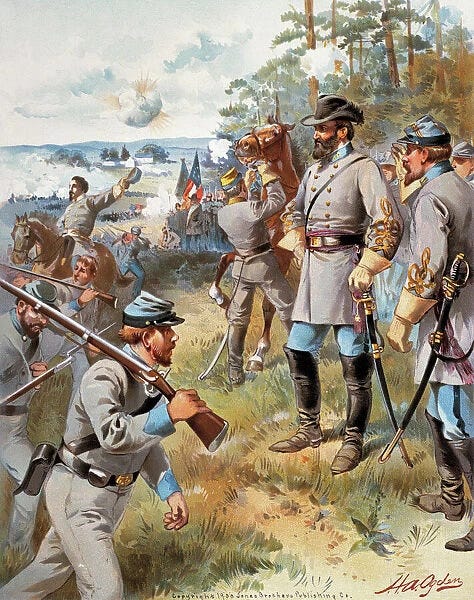I posted this fact, along with this image, earlier today on Bluesky, not thinking twice about it. I am a Civil War historian and thought it was appropriate to mark the bicentennial of Jackson’s birth given his significance both in history and memory.

Not everyone saw it this way.
It appears that some people have a problem drawing a distinction between describing somethinga about the past and celebrating it.
Here are a few choice responses to my post:
“Rest in piss, Stoney!”
“Evil and a loser? What a legacy!”
“He valued the lives of his soldiers less than the lives of his slaves. He rots in a traitor's grave.”
“How many years has he been in Hell, though? That’s the real number to celebrate.”
“Loser!”
And then there is Scott, who interpreted my post as implying that I may have voted for Donald Trump.
“You are celebrating the birthday of a man who committed treason in defense of slavery. Looks like a soft spot to me. And you didn't answer my question about your vote for Trump.”
I seriously worry about the mental health of some of these people. It’s an incredibly unhelpful way of approaching the past. Than again, such comments may have very little to do with any interest at all in history.
I find these responses to be discouraging on a number of levels. In fact, I will go as far as to suggest that they represent as problematic a view of the past as compared to those people who subscribe to some aspect of the Lost Cause.
Both perspectives reduce the past to little more than a morality play. Neither approach acknowledges the humanity or the complexity of the people who lived long ago. They either fall into one of two categories: hero or villian.
As historians of the Civil War era we have an obligation to understand Jackson and Confederates generally in their entirety. Any attempt to reduce these men down to one simple throwaway line does nothing more than distort their stories.
Unfortunately, it has become more difficult to talk about Confederate soldiers over the past few years. Attempts to explore the history of these men beyond the subject of slavery is often interpreted as explicit or disguised Lost Cause rhetoric. Any attempt to humanize these men is viewed as racist.
This is not only a misguided approach to the past, it runs the risk of creating new myths and distortions about the Civil War. Most of my published work over the years has been an attempt to center the story of slavery in the Civil War and even in the Confederate army itself, but this can be done without distorting the lives of the men who served in their ranks and turning them into one-dimensional figures.
My good friend and fellow historian Peter Carmichael makes this point crystal clear in the introduction to the published correspondence of General Gabriel C. Wharton and Anne Radford Wharton:
One might question the worthiness of studying white people who owned Black bodies, when they left a paper trail that today seems so inattentive to their culpability in the injustices of slavery. It is a reasonable reservation, but it should not keep us from exploring how historical actors lived, thought, and acted… To render final judgement on the Wharton’s for their failings—whether as husband and wife, as Confederates, or as slaveholders—is not particularly revealing or useful. Instead, one would do well to focus on the ways nineteenth century Virginians like the Whartons navigated the jarring contradictions between their high ideals and the ugly realities of daily life. This approach requires that we acknowledge the great distance and difference that separates us from people in the past. If we refuse to do so, we risk losing touch with valuable historical sources such as those presented here.
The correspondence between Gabriel and Anne Wharton offers a remarkable portal into a unique sensibilitiy of the past. What is commonly understood as the foreignness of history is discoverable when empathy is shown for all historical actors. Empathy should not be confused with acceptance of the unacceptable or conflated with sympathy for the detestable. Empathy is about understanding how a life in the past, which seems morally incomprehensible and unjustified today, made sense to those who were living it then. (p. ix)
Exercising empathy when thinking about individuals that we find morally problematic not only sheds light on the world in which they inhabited. I suspect that it is also the way we hope that future generations will judge our society’s decisions and each of us as individuals.





Yes, empathy is needed! "What is commonly understood as the foreignness of history is discoverable when empathy is shown for all historical actors. Empathy should not be confused with acceptance of the unacceptable or conflated with sympathy for the detestable." Great quote.
Studying major Confederate figures is a little like studying major German figures of the 20s to the 40s. These are generally not ignorant people who believed things we find difficult to understand today. I think it is important for historians to explore these people and what they believed so that we may better understand major events that shaped our world, and hopefully not repeat this events.